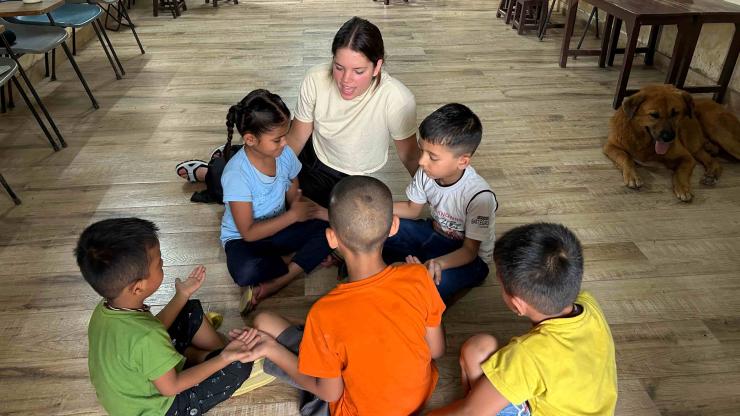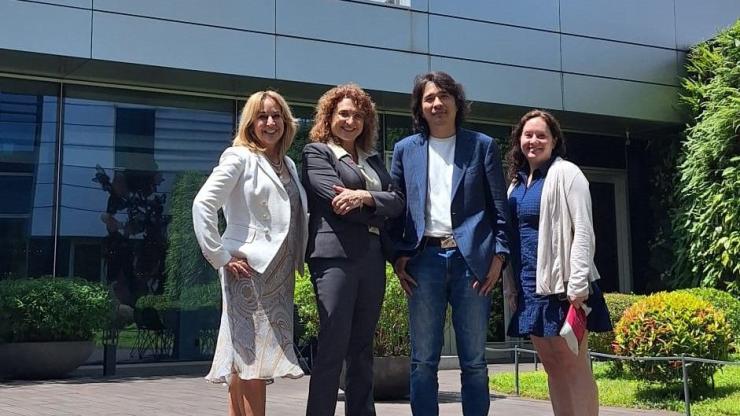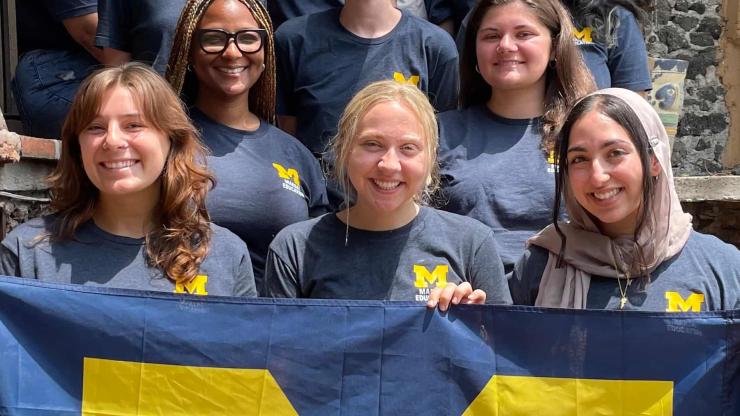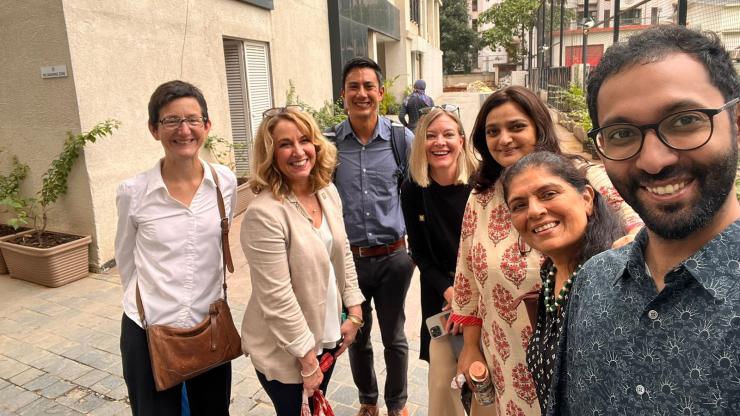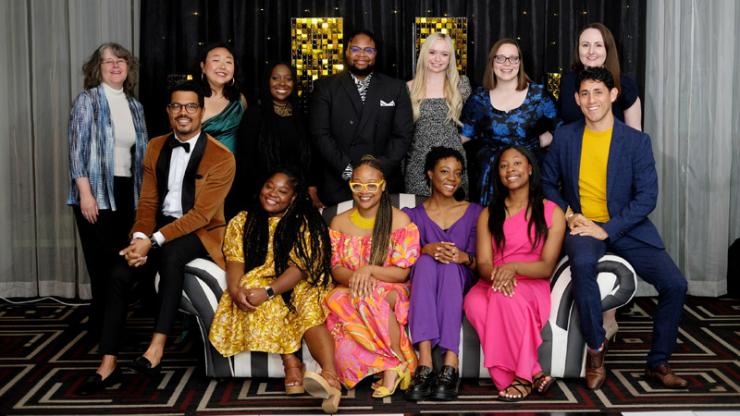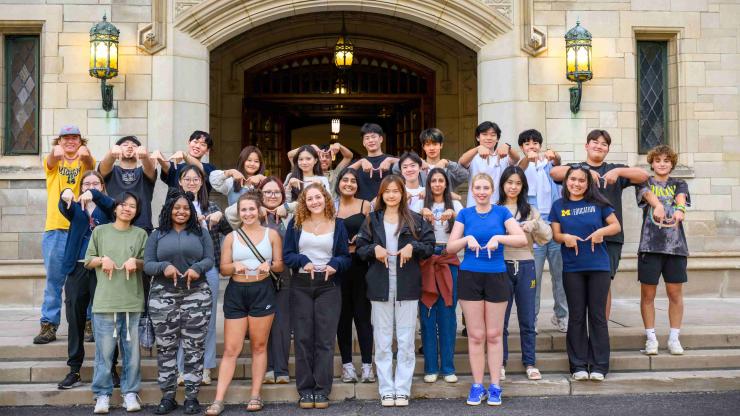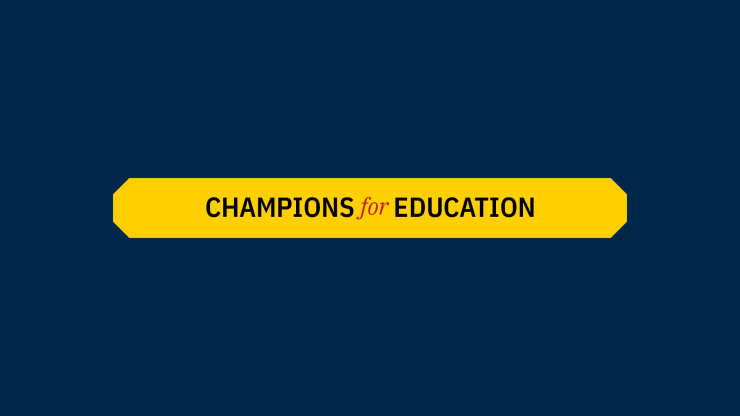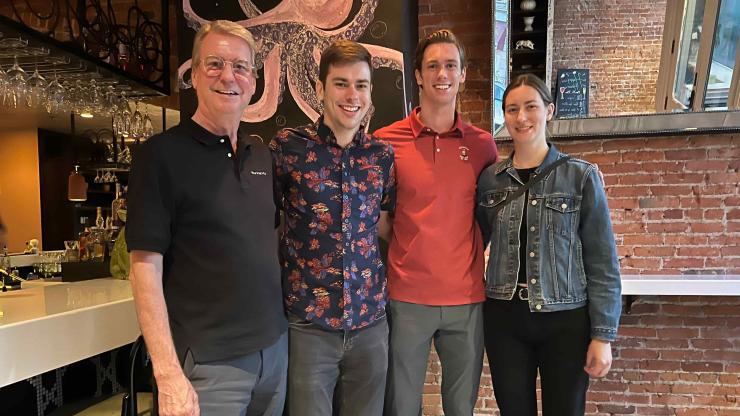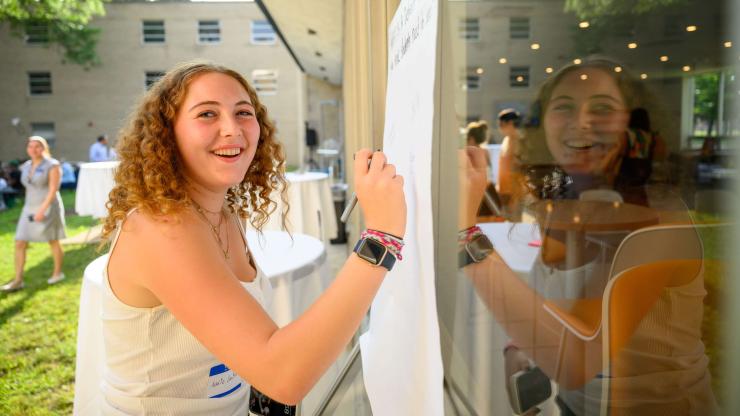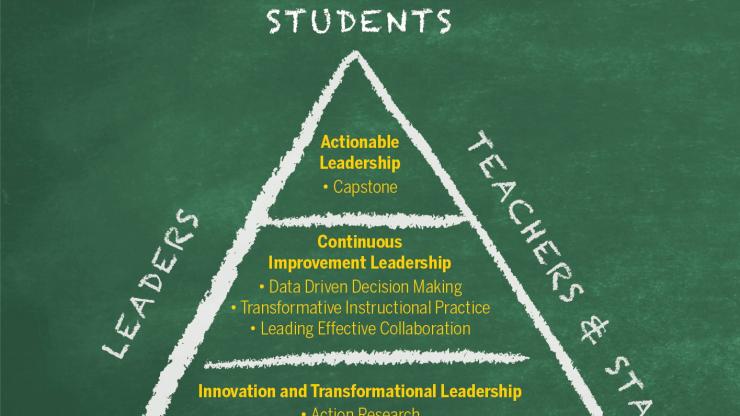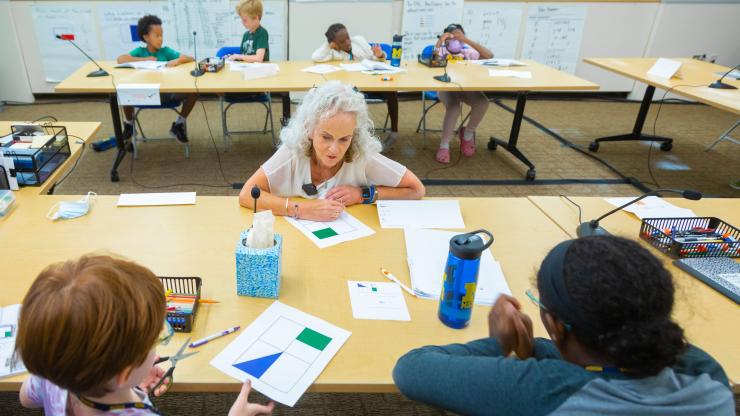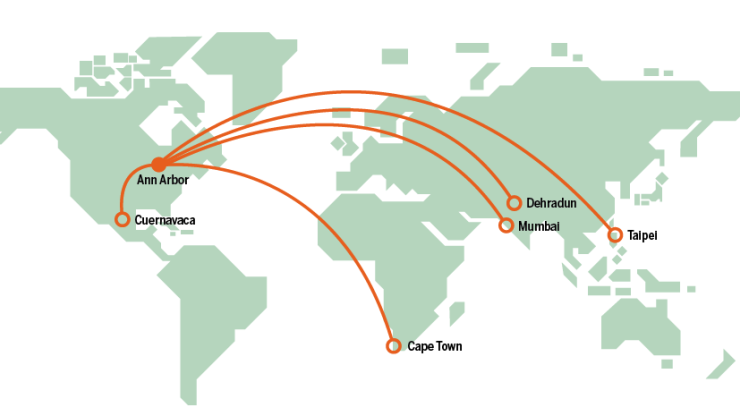Meet the Marsal Family School of Education's New Faculty Members
This fall, the Marsal School welcomes four talented academics to its community
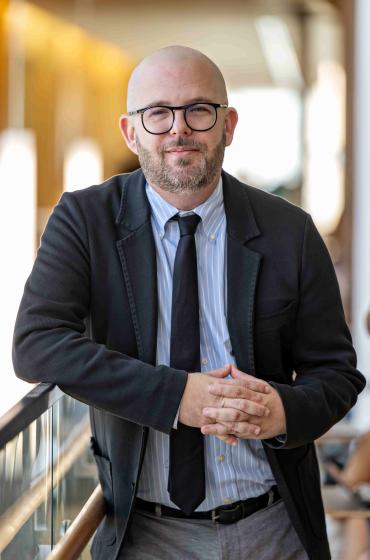
Dr. Michael Brown
Dr. Michael Brown (PhD '17) is a scholar of curriculum development, pedagogy, and instructional technology in undergraduate education. His research integrates theories of learning, socio-technical systems, and higher education organizations. To conduct his research, Brown leverages qualitative and quantitative methods as well as research partnerships to understand influences on students' academic performance and persistence. He is particularly interested in the influence of students' social and academic networks which create the structure for their learning interactions, their time in classrooms, and their time in broader learning communities. His work has been funded by the National Science Foundation, the Future of Privacy Forum, and a Transformative Research Grant from the Spencer Foundation.
Brown's scholarship has been published broadly, with numerous peer-reviewed articles appearing in journals including Review of Higher Education and the Journal of Higher Education, as well as pieces in public scholarship outlets, and in invited book chapters. A dedicated advisor and mentor, he has taught courses at the master's and doctoral levels focused on research methods, learning and organizational theories, and cultural approaches to the study of higher education. He has been recognized for excellence in teaching and research by the AERA (American Educational Research Association) Social Studies Special Interest Group and the Society for Learning Analytics Research.
Before pursuing his doctoral degree at the University of Michigan, Brown held university staff roles as coordinator of LGBT student involvement and leadership at Washington University in St. Louis and as associate director of the K.C. Potter Center for LGBTQIA+ Life at Vanderbilt University. He returns to his alma mater from the School of Education at Iowa State University, where he served as assistant professor of higher education.
You received accolades for your use of Open Education Resources (OER) when you were at Iowa State. This is an area of interest to many people as a way to reduce barriers to education, but there is clearly still a lot of work to be done. What do you see as next steps that educators and institutions need to take to make these resources increasingly accessible and useful?
One key obstacle I've observed in research with teacher education candidates is that very few resources exist that help educators, parents, or whoever might be looking for learning resources to make evaluation decisions about the quality of what's available. We recently proposed the development of online curriculum cooperative platforms where folks can have conversations about what's working, where the resource falls short, and how they've repurposed the tool for different learning environments and communities.
What courses are you teaching at the Marsal School this academic year?
I'm currently teaching Introduction to Education Research for our master's students in the Center for the Study of Higher and Postsecondary Education. I'm looking forward to teaching courses on curriculum making, pedagogy, and learning assessment in the coming semesters.
In a recent publication, you and Dr. Rachel Smith use "network mapping" to shed new light on the relationship between campus environments and student development. What were you able to understand about campus ecological networks through the application of network mapping?
The last five years have been a brutal reminder that environmental conditions play a significant role in college student learning and development. When I talk to college instructors, what they often have trouble visualizing is the complex social worlds that students inhabit outside of their classrooms, and how those worlds come to impact what students are doing during class time. By offering instructors the tools of social network mapping, we can help them understand how students' relationships become a key factor in their academic success. Supporting students as they find the supportive resources they need to keep their relational ecologies healthy will, we believe, promote classroom learning. Network mapping helps faculty and students identify where resources like time, energy, and care should be dedicated.
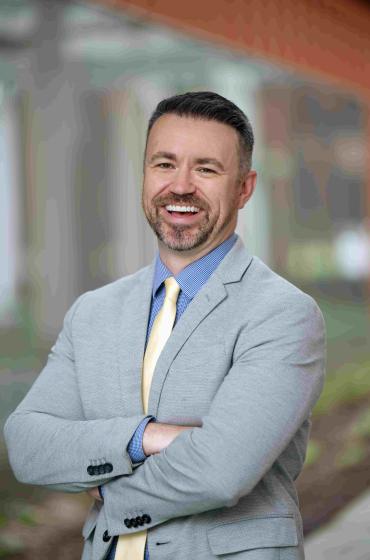
Dr. Walter Ecton
An early-career higher and postsecondary education scholar, Dr. Walter Ecton researches the intersections between high school, higher education, and the workforce, and the pathways students take as they navigate those sectors. His expertise in studying how youth and adults matriculate into and pursue postsecondary education through a lens of diversity, inclusion, justice, and equity is a welcome addition to the Center for the Study of Higher and Postsecondary Education at the Marsal School.
Ecton's work primarily focuses on students who take nontraditional pathways through education, with particular focus on high school students in career and technical education, students who attend community colleges, and students who return to education later in life. He aims to produce research that can inform local, state, and federal policy decisions, and that shines a light on the importance of equitable access to high quality educational opportunities for all students.
In addition to publication of journal articles, book chapters, articles, and blogposts that reach broader public audiences, Ecton's research has been funded by the Institute of Education Sciences, the Florida Department of Education, the American Educational Research Association-National Science Foundation.
A former high school social studies teacher, Ecton holds a PhD in leadership and policy studies from Peabody College at Vanderbilt University. He joins the faculty at the Marsal School after serving as an assistant professor of Educational Leadership and Policy Studies at Florida State University, where he earned a reputation for being a dedicated advisor and mentor to graduate students, particularly those from diverse backgrounds.
In one of your recent studies, you find that 47 percent of Tennessee's four-year university students and 62 percent of community college students work while enrolled. What do you think institutions could be doing differently to serve these large populations of working students?
Traditionally, we've often thought about "school" and "work" as two separate stages of life, but this is simply no longer the case for most students. Institutions need to recognize that "working adults" are no longer a niche population on most college campuses; they're now the norm. We have to be even more thoughtful about designing class schedules that allow for weekend and evening coursetaking, providing support services like tutoring that are accessible to students who may not be able to be on campus during business hours, and offering short-term "emergency" financial assistance to students who may be between jobs. Students today are much more than just students. We need policies and support structures that recognize this.
You have engaged in several studies of Career and Technical Education (CTE), which has seen growing enrollment for several decades. Though there is a dearth of research on this important aspect of education, can you share some findings that our alumni might be surprised to learn about the CTE landscape today?
Career and Technical Education was historically (and is sometimes still) called "Vocational Education," with classes like "shop," auto repair, construction, or cosmetology perhaps coming to mind. This type of CTE still exists today, and we still need people skilled in those professions, which often can pay quite well, especially for those with advanced training at technical and community colleges. But CTE over the past two decades has dramatically shifted to an increasing focus on applied STEM fields like engineering, healthcare, and IT. In high school, CTE students still largely take a college-preparatory curriculum, and much of the nation's CTE happens at the postsecondary level. Like with any type of education, there's still a lot of variation in quality and rigor, but high-quality CTE often sets students up for good-paying career paths. One final thing that might surprise people: most students today (over 80 percent nationally) take at least some CTE classes during their educational career, often as electives!
Why should people care about Career and Technical Education?
All students deserve to leave school with the tools needed to enter a career that pays enough for a decent, comfortable life. While education can and should do so much more, if every student doesn't end their schooling prepared for a good-paying job, we've really failed them. Also, as much as we encourage students to go earn a bachelor's degree after high school, over half of U.S. students still never earn a bachelor's degree. We have a moral imperative to help these students (who are disproportionately low-income, racially minoritized, and disabled) prepare for a career. And even for these students, postsecondary education plays an important role. Many students will seek out CTE programs at community and technical colleges, both during and after high school, in addition to later in their career if they need an additional credential or new skill to earn a promotion or change career paths. If we care about education as a tool for reducing inequality in our society, it's important to recognize that CTE plays an important role in many students' educational journey. As educators, we need to ensure that students' CTE experiences are high quality, and that access to the best-quality CTE programs is equitable and just.
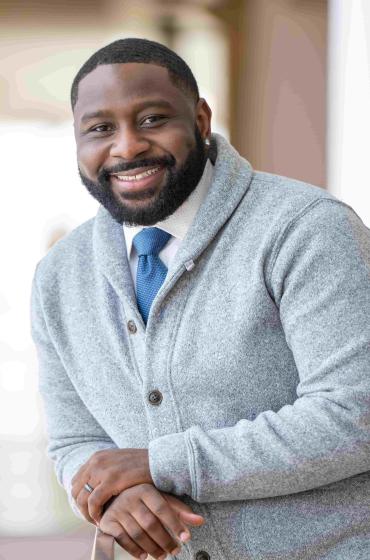
Dr. Demetri L. Morgan
Dr. Demetri L. Morgan's scholarship explores the role that higher education institutions can and should play in a diverse democracy. He seeks to illuminate, in anti-deficit ways, how people navigate, resist, and transform systems, policies, and organizational cultures. He investigates various lines of inquiry, including how student political engagement and activism (re)shape institutions, the impact of governing boards for institutional transformation, and the identification of more organizationally sustainable approaches to science, technology, engineering, and math (STEM) education that enhances social responsibility. Morgan is the co-director of the recently launched Center for Strategic & Inclusive Governance (CSIG) housed at the University of Michigan and the University of California, Riverside and a faculty fellow of the AAUP's Center for the Defense of Academic Freedom.
Morgan has published numerous peer-reviewed articles in a range of outlets such as The Journal of Higher Education, Higher Education: Handbook of Theory & Research, and Research in Higher Education. Additionally, he has published book chapters and technical reports, and in 2019 coedited the book Student Activism, Politics, and Campus Climate in Higher Education with Dr. Charles H. F. Davis III. Morgan has garnered over $5 million in external grant funding from the National Science Foundation, Dana Foundation, Spencer Foundation, and Lumina Foundation.
Morgan is a highly sought scholar who has been asked to provide training for university leaders and offer commentary in local, regional, and national news outlets. He has been recognized as a 2021–2023 ACPA-College Student Educators International Emerging Scholar and the winner of the 2018 NASPA Technology Knowledge Community Innovation Award. He has taught a wide range of courses at the graduate and undergraduate levels focused on higher education budgeting and finance, organization and governance, multiculturalism and social justice, and contemporary political issues. In 2018, he was named a finalist for the Faculty of the Year Award at Loyola University Chicago.
Morgan joins the Center for the Study of Higher and Postsecondary Education (CSHPE) at the Marsal School from the School of Education at Loyola University, where he served as an associate professor.
Why do you believe that postsecondary education is important for democracy?
I understand democracy (or more accurately, though less succinctly, a "plurinational representative republic") as both a form of governance and a social arrangement that recognizes and safeguards the inalienable rights of individuals and peoples, as articulated in the Declaration of Independence, the Constitution, the Bill of Rights, and many of the founding documents and agreements of the country. However, living in a "democracy" comes with the immense responsibility to collectively "keep it" that way, echoing Benjamin Franklin's pithy response when asked if the fledgling country was a republic or a monarchy. Keeping a democracy that works for everyone requires an enduring sensitivity to the history and legacy of colonization, displacement, chattel slavery, and the subjugation of groups based on their identities, faith practices, and countries of origin.
Higher education, at its best and uniquely, relative to other pillars of society (e.g., media, faith-based institutions, industry, government), is involved in pursuing, preserving, and disseminating knowledge through teaching. The pursuit, preservation, and dissemination of knowledge, about all sorts of things, is integral to the project of (re)building a society that works for everyone and is appropriately responsive to the most pressing challenges we face today. Therefore, my bet is that the more accessible, effective, and equitable higher education is, the better the chances are that contributions, both great and small, are realized that advance the greater good.
What drew you to join the faculty of the Center for the Study of Higher and Postsecondary Education at the Marsal School?
In every decade since its founding, CSHPE has been at the forefront of shaping higher education through the high-quality education it provides its students, the groundbreaking scholarship produced by its faculty that has informed policy and practice, and its active alumnx community who have gone on to be leaders and luminaries in the field. As the issues facing society evolve, the opportunity to come alongside some of the best students, scholars, and teachers in the country to re-up and expand CSHPE's legacy was too great to pass up. I am also activated by the broader vision of the Marsal School to really positively impact the full educational lifespan of people, the commitment to serving our surrounding communities, and the chance to shape the future of graduate education.
Activism on U.S. college campuses has a long history. As a scholar, how do you see campus activism evolving?
On the student side of things, the access to a wealth of information and the proliferation of social media have introduced new dimensions to campus activism that are still unfolding. These factors influence how activism is practiced and its impact, as highlighted in my CSHPE colleague Professor Charles Davis's work.
However, I am increasingly concerned with how some campus leaders and policymakers are responding to activism. There seems to be a lack of recognition of students' developmental trajectories and the educational potential of these interactions. When responses are transactional and adversarial rather than educational and communal, the opportunity for transformational growth—for students, administrators, alumnx, the institution, and society—is wasted.
If this is the case, we will see activism continue to challenge the status quo and stakeholders will remain at odds, if not doubling down. That is why I believe we would be better served if we viewed activism as a thermometer that reflects the health (or lack thereof) of our social arrangements and remind ourselves that the appropriate response to a thermometer indicating a fever is not to arrest or ignore the thermometer for telling us something we would rather not know. Instead, we should address the underlying causes of the "fever" with our best know-how, good faith, and a commitment to meaningful change through the educational process.
This approach requires us to engage with activism as an opportunity for real cross-cutting dialogue and tangible improvement, rather than as a threat to be suppressed or a nuisance to be endured. By doing so, we can create a more responsive and supportive educational environment that fosters growth for all involved.
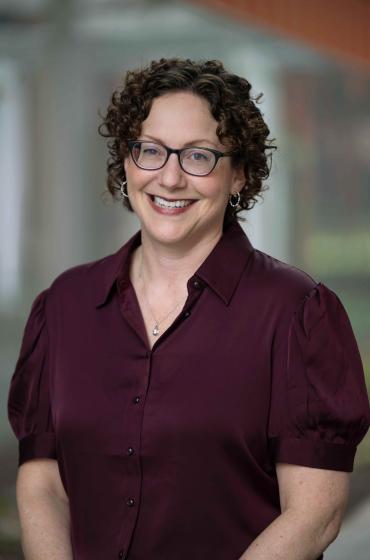
Dr. Tanya S. Wright
An early literacy scholar who studies curriculum and instruction in language and literacy during the early childhood (birth through age eight) years, Dr. Tanya S. Wright's (PhD '11) research focuses on pre-kindergarten through second grade vocabulary and knowledge development and the integration of literacy and science learning for young children. As Wright's work is driven by a commitment to ensuring equitable access to high-quality literacy instruction, she partners with teachers and children in diverse and under-resourced communities on the creation of culturally relevant materials and methods.
Wright's research has been published in journals including Reading Research Quarterly and The Elementary School Journal, as well as practitioner-oriented outlets such as The Reading Teacher. She has authored or co-authored five books for teachers and parents including Literacy Learning for Infants, Toddlers, and Preschoolers: Key Practices for Educators (2022), which received the Academic Choice Smart Book Award in 2023, and A Teacher's Guide to Vocabulary Development Across the Day (2020). She has garnered external funding for her research in grant support from organizations that include the W.K. Kellogg Foundation, the Spencer Foundation, the Institute for Education Sciences, the National Science Foundation, and OpenSciEd. In 2022, she received the Jerry Johns Outstanding Teacher Educator in Reading Award.
Wright has taught reading-focused courses at all levels, including reading methods courses and research courses. In addition to the content of her courses, students have praised the scaffolding of Wright's assignments, and the variety of ways that she presents and invites students to grapple with content, via discussion, writings, and presentations. She is also a dedicated mentor and advisor.
Wright returns to her alma mater from Michigan State University where she was an associate professor with tenure.
In a lot of your scholarship, you have focused on developing and testing curriculum and professional learning resources focused on supporting integrated literacy and science instruction for K-2 students. Why is that an important focus for the beginning of elementary school?
Most people agree that teaching children to read and write is important in the early grades of elementary school, but sometimes science instruction gets pushed out of the curriculum because of this focus on early literacy. So children don't get any science instruction. This limited time for science is a problem for children's science education because young children are excited to learn about how the natural and engineered world works. It is also a problem for children's literacy development because knowledge about the world is very important for text comprehension. As a literacy researcher, I got interested in science because there are so many opportunities for children to build knowledge and vocabulary that will help their literacy development. In my work with my colleague, Dr. Amelia Gotwals at MSU, we have shown that science and literacy instruction don't need to fight for time in the elementary school day. Instead we can support children's science learning and meet our goals for early language and literacy development by planning for integrated instruction.
In a recent study published earlier this year, "Understanding K‐3 Teachers' Literacy Instructional Practices During the Pandemic‐Impacted 2020–2021 School Year" published in Reading Research Quarterly, you looked at literacy instruction during the COVID-19 pandemic. What did you find?
It was very difficult for researchers to figure out what was actually happening in schools during the 2020–2021 school year because of safety restrictions preventing observations in classrooms. But there were a lot of assumptions that children received "bad" instruction during this time. Our research team was able to send Swivl technology (a robotic mount, where a tablet or smartphone can be placed to take the video) into 25 classrooms to capture literacy instruction, or we recorded Zoom instruction for fully online situations. Our findings indicated that the quality of literacy instruction was unrelated to modality (virtual, hybrid, or in person) or to time. In other words, some teachers provided really high-quality instruction even if they were in online or hybrid spaces and only had a short time to work with kids. These findings challenge existing theories that all the instruction children received during this time was of poor quality.
What research questions are you are eager to pursue here at the Marsal School?
In all of my scholarship, whether I am looking at current instructional practices, policies that impact instruction, new instructional methods, or supports for teachers' professional learning, I am always interested in figuring out how best to provide equitable opportunities for young children to learn literacy in school. I look forward to continuing my research in this area and also to teaching our wonderful future elementary school teachers at the Marsal Family School of Education.
